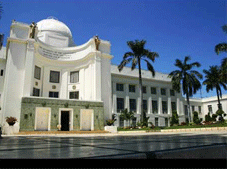The Language
 Cebuano, also known as Sugbuanon, is an Austronesian language spoken in the Philippines by about 18,000,000 people and is a subgroup or member of Bisaya, Visayan and Binisayâ. The name came from the Philippine island of Cebu, with the Spanish suffix -ano meaning native, of a place, added at the end. Cebuano is given the ISO 639-2 code ceb.
Cebuano, also known as Sugbuanon, is an Austronesian language spoken in the Philippines by about 18,000,000 people and is a subgroup or member of Bisaya, Visayan and Binisayâ. The name came from the Philippine island of Cebu, with the Spanish suffix -ano meaning native, of a place, added at the end. Cebuano is given the ISO 639-2 code ceb.
Cebuano is spoken natively by the inhabitants of Cebu, Bohol, Negros Oriental and the people in western Leyte province and northern Mindanao.
Cebuano is a language with Verb Subject Object sentence order. It uses prepositions rather than postpositions. Nouns come after adjectives, but before genitives or relative phrases.
Cebuano has sixteen consonants: p, t, k, ? (the glottal stop), b, d, g, m, n, ng, s, h, w, l, r and y. There are three vowels: i, a, and u/o. The vowels u and o are allophones, with u always being used when it is the beginning of a syllable, and o always used when it ends a syllable. Accent is also a distinguisher of words, so that dápit means "to invite", while dapít means "place".
Nouns in Cebuano are inflected for person, number, and case, with inclusive and exclusive "we" distinguished. The four cases are nominative, preposed genitive, postposed genitive, and oblique.
Cebuano has long borrowed words from Spanish, such as krus [cruz] (cross) and brilyante [brillante] (brilliant). It has several hundred loan words from English as well, which are altered to conform to the limited phonemic inventory of Cebuano: brislit (bracelet), hayskul (high school), syapin (shopping), dikstrus (dextrose), sipir (zipper), bigsyat (big shot), or prayd tsikin (fried chicken).
The Clamor for recognition of Cebuano
The use of Tagalog as a basis for Pilipino drew criticism from other Philippine linguistic groups. To some extent, there was active resistance shown against its usage. For instance, the Philippine national anthem is sometimes sung in Cebuano and not in Pilipino in the island province of Cebu. This resistance did not threaten the country's national sovereignty. On the part of the Cebuanos, this may be a mere clamor for linguistic recognition. Their clamor for recognition might be based on the following arguments:
Historically, Cebu is the first and oldest City in the Philippines. Long before Manila fell into the hands of the Spanish Conquerors in the 16th century, Cebu was already an established trading and military post for the Spaniards. Linguistically, Cebuano is recently, the country's second most widely used language. During the independence, it was the first largest linguistic group. Cebuano, though originally spoken only in the island of Cebu, is now being spoken in many parts of Mindanao, the eastern part of Negros island, and Bohol. Strategically, due to its geographical location, Cebu is the alternate gateway to Manila adding significance to its language. Cebuano is the native language of more regions than Tagalog, being the language with the most native speakers in Region VII (Central Visayas), Region IX (Western Mindanao), Region X (Northern Mindanao), Region XI (Davao Region), Caraga Region, and Region XII (Southern Mindanao). There are also significant number of speakers in Region VI (Western Visayas, mostly in San Carlos City and neighboring areas) and Region VIII (Eastern Visayas, mostly in western Leyte and Southern Leyte). By comparison, Tagalog is the language of the majority in the NCR, Region IV-A, Region IV-B, and Region III (Central Luzon, where Kapampangan and Ilocano also dominate some areas).
Numbers
1 usá;
2 duhá;
3 tulú;
4 upát
;5 limá;
6 unúm;
7 pitú;
8 walú;
9 siyám;
10 napúlu;
11 napúlu'g usá
11 onse (Spanish is frequently used for numbers above 10)
25 bentsingko;
100 usá ka gatos;
1000 usá ka libo
Common expressions
May I ask a question? Mahimo bang mangutana? Puwede 'ko mangutana?
Good Morning! Maayong buntag!
Where are you going? Asa ka padulong?
Where is the bathroom? Asa man ang CR(banyo)?
Where is your bathroom? Asa man ang CR(banyo) 'ninyo?
What is your name? Unsay ngalan nimo?
Where is the market? Asa man ang merkado?
I would like to buy that. Paliton na nako.
I would like two of those. Gusto ko ug duha ana.
Hello, my name is John Kumusta, John akong ngalan., or coloquially, "Ako si John"
Menu
Santo Nino Hymn in Cebuano
Batobalani
sa gugma,
Sa daan tawo palanga.
Tubag:
KANAMO MALOOY KA UNTA
NGA KANIMO NANGILABA
Dinhi
sa siudad sa Sugbo
ang matahum mong larawan.
sa unang mga misionero,
sa usang balay hipalgan.
Kanila ikaw nagpakita
gikan da sa imong gugma.
Tubag:
KANAMO MALOOY KA UNTA
NGA KANIMO NANGILABA
Giludhan
ikaw gisingba
niadtong mga kaparian
sa tanan nga katawhan
sa mga ponoan nila:
kay sa pagtan-aw kanimo
Kristianos sila nahimo.
Tubag:
KANAMO MALOOY KA UNTA
NGA KANIMO NANGILABA
Ang
singbahan gipatindog
niadtong mga tawhana,
aron ang larawan nimo
dunay usang puluy-anan.
ug didto gihangyo nila
nga kaluyan nimo sila.
Tubag:
KANAMO MALOOY KA UNTA
NGA KANIMO NANGILABA
Nangayo
kami kanimo
nga ang matahum mong larawan,
sa sulud sa kalag namo
makahimong puluy-anan,
kay sa tanan kinahanglan
ikaw ang among dalangpan.
Tubag:
KANAMO MALOOY KA UNTA
NGA KANIMO NANGILABA

 <
< <
< <
<